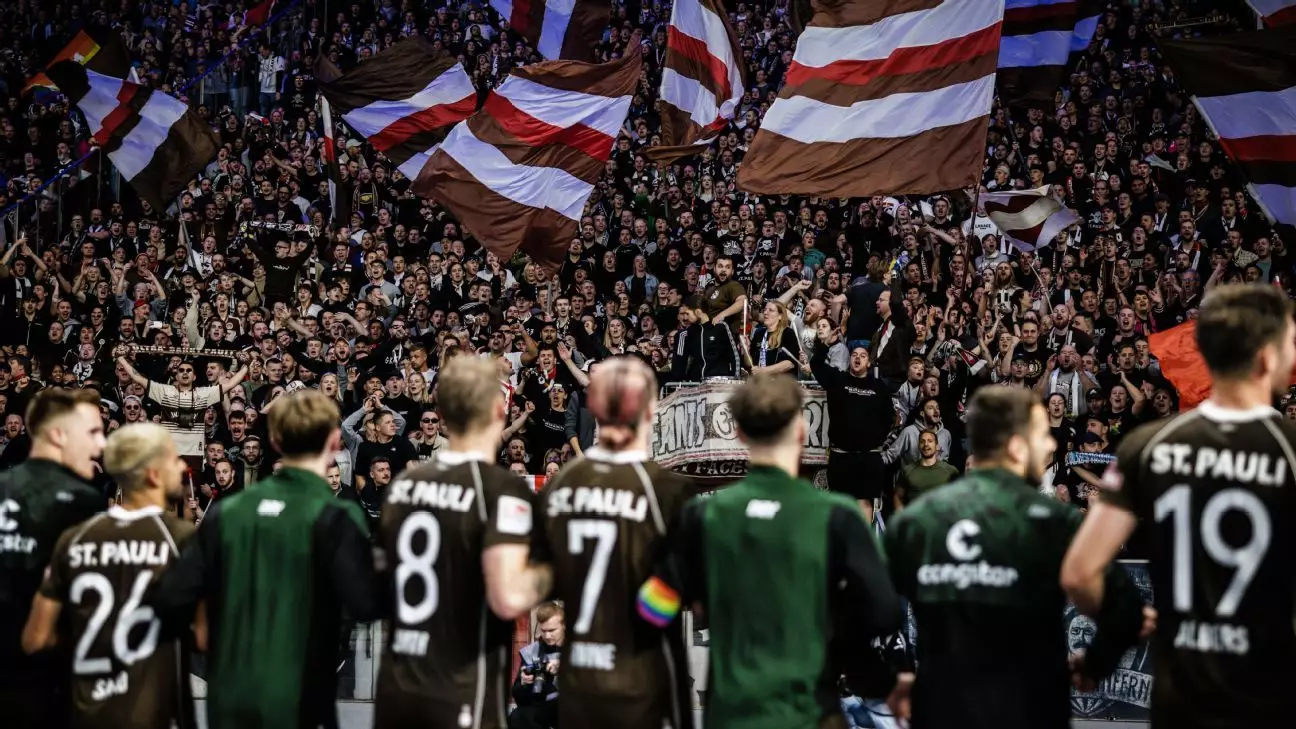In the world of sports, the prevailing sentiment among many in the United States and the United Kingdom is that politics and athletics should remain separate spheres. However, turning our gaze towards Germany—particularly to the beloved St. Pauli football club—reveals a nuanced reality that shatters this simplistic dichotomy. In fact, the intersection of football and social activism is not just apparent; it is foundational to the identity of this extraordinary club. Situated in Hamburg, St. Pauli transcends the traditional role of a sports team, acting as a vocal ally for community rights and social justice.
The unique essence of St. Pauli, which has recently returned to the Bundesliga, can be traced back to its deep-rooted connections within the local community of Hamburg. This neighborhood, notorious for its vibrant nightlife and diverse population, is an ideal backdrop for a club that proudly champions leftist agendas. With a clear focus on equality and inclusivity, St. Pauli stands out in a landscape often marred by discrimination and bigotry.
St. Pauli’s active involvement in social issues can be traced back to its inception as a small football club in the 1980s. Emerging from a backdrop characterized by alternative music scenes and pressing social challenges like homelessness and gentrification, St. Pauli quickly gained notoriety as a platform for activism. During a time when many clubs remained passive or even colluded with extreme right-wing ideologies, St. Pauli presented a refreshing contrast—an embodiment of the people’s voice.
The visible symbols of this activism are aplenty. Fans frequently spot slogans such as “No One Is Illegal” and “Refugees Welcome” plastered across banners and stickers in their vicinity. This commitment to social justice transcends mere words; it manifests in actions, from the club’s community outreach initiatives to the solidarity expressed through themed merchandise. For instance, the club sported a unique shirt declaring, “No Football for Fascists,” in a notable stand against bigotry.
The Heartbeat of Millerntor Stadium
Attending a match at Millerntor Stadium is an experience like no other—one that combines the excitement of football with a celebration of culture and community. This venue, which seats just under 30,000 spectators, pulsates with energy, as music blends seamlessly into the matchday atmosphere. From AC/DC’s iconic “Hell’s Bells” signaling the players’ entrance to Blur’s “Song 2” heralding a St. Pauli goal, every moment at Millerntor resounds with spirit and fervor.
While the club’s inclusivity and camaraderie attract a dedicated following, obtaining tickets has grown increasingly challenging. There is an overwhelming demand, with fans from around the globe vying for the authenticity that St. Pauli represents, an alternative to the homogenized corporate atmosphere found in many football arenas today.
Facing Giants: The Legacy of Struggle and Resilience
As St. Pauli gears up to take on footballing juggernauts like Bayern Munich, echoes of past encounters arise, rekindling memories among supporters. During the 2001-02 season, the Kiezkicker faced elimination but remarkably secured a famous victory over the league’s champions. This unexpected triumph led to the creation of the whimsical title “Weltpokalsiegerbesieger”—a testament to the bond between the club and its fanbase.
Despite financial difficulties and relegations, St. Pauli has remained resilient, reaching significant milestones, such as their deep run in the DFB-Pokal in the mid-2000s, where they took on impressive opponents like Hertha Berlin and Werder Bremen. The narrative of their struggles and achievements has been masterfully documented in films like “Das Wunder von St. Pauli,” capturing the heart and soul inherent in the club’s journey.
St. Pauli has embraced an innovative cooperative model, which allows fans to take ownership of the club’s future. This initiative, inspired by principles seen in other sectors of German society, encourages supporters to buy shares in the club. However, a crucial aspect of this model is its democratic structure: no matter how many shares one purchases, each fan retains equal voting rights. This paradigm serves as a powerful counterbalance to the tendency of modern football to be dominated by wealthy investors, who may prioritize profit over genuine connection with the community.
With the cooperative model, fans are not only stakeholders in their club but also have a say in decisions about the modernization of Millerntor Stadium and potential investment in training facilities. The club’s leadership, exemplified by president Oke Göttlich, underscores a commitment to remaining true to St. Pauli’s founding principles, ensuring that commercial interests do not overshadow the community-driven mission.
The Legacy of St. Pauli: More than Just a Football Club
In an increasingly polarized world, St. Pauli stands as a beacon of hope for those yearning for a vibrant, inclusive community. While the club may not resonate with everyone, its identity reflects the values and aspirations of those who believe in social justice and unity. As millions tune in to witness St. Pauli’s matches, they are not merely spectators in a game of football; they are participants in a narrative that champions neighborly values and collective progress.
In essence, the Kiezkickers represent so much more than athletic prowess; they symbolize the potency of community engagement, unwavering activism, and the relentless pursuit of equality. The spirit of St. Pauli reminds us that, even in the world of football, there is room for meaningful change and hopeful ideals.
